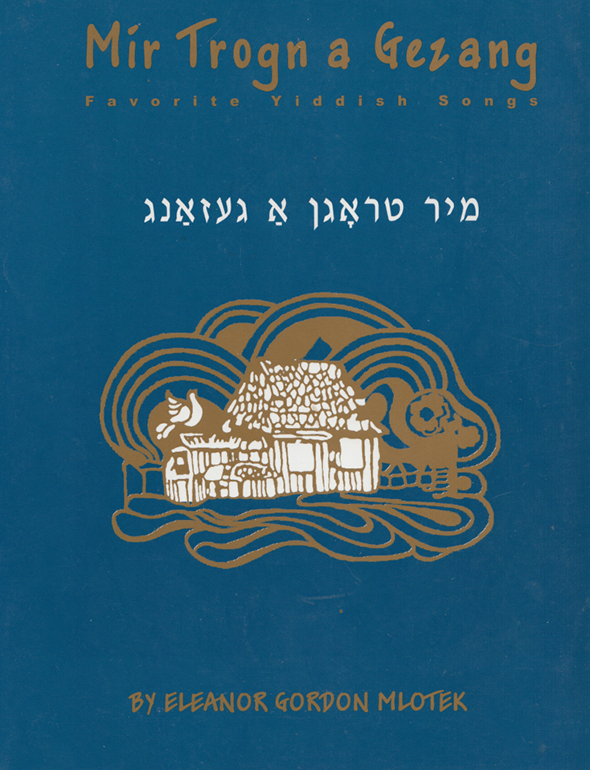
The sun has set. Grown gloomy,
I lie alone, saddened, near the woods,
and think of my youth, ah, happy years,
and a longing for them takes me.
And suddenly, I see, it’s unbelievable,
can this simply be a dream?
A flock of white doves comes flying
and they stop and stand around me.
And I feel so young, as though with them
my youth has returned again.
And I listen to the doves coo and murmur
and I can understand their words.
“For a while now, you have remembered us,
do you recognize us? Take a good look,
we are your bygone years
for which you have been longing.
“We have heard the call of your heart,
your loneliness, your endless longing,
so we have come again as doves
and will stay with you forever.”
I reach out my hand to them,
“You are young,” I hear a cooing in the wood,
then suddenly I wake up, it was merely a dream,
I lie alone, despondent and old.
Di zun iz fargangen, shoyn triblekh gevorn,
Kh’lig eynzam, farumert baym vald
Un trakht fun mayn yugnt, akh, gliklekhe yorn,
A benkshaft nokh zey mikh bafalt.
Un plutslung derze ikh, es vilt zikh nisht gleybn,
Tsi zol dos a kholem zayn bloyz?
Es kumen tsu shvebn fil vaysinke toybn
Un shteln arum mir zikh oys.
Un kh’fil azoy yung zikh, vi s’volt mit zey kumen
Mayn yugnt tsurik fun dos nay,
Un kh’her vi di taybelekh vorken un brumen,
Kh’farnem ot di verter fun zey:
-Du host far a vayl undz dermont in zikorn,
Derkenst undz? kuk ayn zikh genoy,
Dos zenen mir dayne fargangene yorn,
Nokh velkhe dir benkt zikh azoy.
Mir hobn dem ruf fun dayn hartsn farnumen,
Dayn umet, dayn benken on shir,
Nu, zenen mir taybelekh vider gekumen
Un blaybn shoyn eybik mit dir.
lkh shtrek mayne hent oys un gib zey op sholem,
Bist yung, her ikh vorken in vald —
Un plutslung dervakh ikh, geven bloyz a kholem,
Kh’lig eynzam, farumert un alt.
די זון איז פֿאַרגאַנגען, שױן טריבלעך געװאָרן,
כ’ליג אײנזאם, פֿאַראומערט בײַם װאַלד
און טראַכט פֿון מײַן יוגנט, אַך, גליקלעכע יאָרן,
אַ בענקשאַפֿט נאָך זײ מיך באַפֿאַלט.
און פּלוצלונג דערזע איך, עס װילט זיך נישט גלײבן,
צי זאָל דאָס א חלום זײַן בלױז?
עס קומען צו שװעבן פֿיל װײַסינקע טױבן
און שטעלן אַרום מיר זיך אױס.
און כ’פֿיל אַזױ יונג זיך, װי ס’װאָלט מיט זײ קומען
מײַן יוגנט צוריק פֿון דאָס נײַ,
און כ’הער װי די טײַבעלעך װאָרקען און ברומען,
כ’פֿאַרנעם אָט די װערטער פֿון זײ:
— דו האָסט פֿאַר אַ װײַל אונדז דערמאָנט אין זיכּרון,
דערקענסט אונדז? קוק אײַן זיך גענױ,
דאָס זענען מיר דײַנע פֿאַרגאַנגענע יאָרן,
נאָך װעלכע דיר בענקט זיך אַזױ.
מיר האָבן דעם רוף פֿון דײַן האַרצן פֿאַרנומען,
דײַן אומעט, דײַן בענקען אָן שיעור
נו, זענען מיר טײַבעלעך װידער געקומען
און בלײַבן שױן אײביק מיט דיר.
איך שטרעק מײַנע הענט אױס און גיב זײ אָפ שלום,
ביסט יונג, הער איך װאָרקען אין װאַלד —
און פּלוצלונג דערװאַך איך, געװען בלױז אַ חלום,
כ’ליג אײנזאַם, פֿאַראומערט און אַלט.
Song Title: Di Zun lz Fargangen

First published in 1972, Mir Trogn A Gezang: Favorite Yiddish Songs was reprinted six more times (in 1977, 1982, 1985, 1987, 1988, 2000) due to popular demand. The songs in this anthology represent a sampling of beloved folk and well-known Yiddish songs, many of which are scattered in various song collections; some appear in very rare and inaccessible collections; and some were never before published. Folk songs comprise about a third of this volume and were selected mainly on the basis of popularity and sometimes for their historic significance. Needless to say, they are only representative of the vast, rich treasure of Yiddish folk material. The selection was made not only on the basis of personal preference, but in the knowledge they are favorites of many who sing these songs. Most of the songs represent the repertoire that was sung at Yiddish summer camps, May 1st demonstrations and at social gatherings. Many songs were introduced to American Jewry by Jewish immigrants who came to the United States after World War II, for whom these songs had been favorites in Poland and other East European communities destroyed by the Nazis.